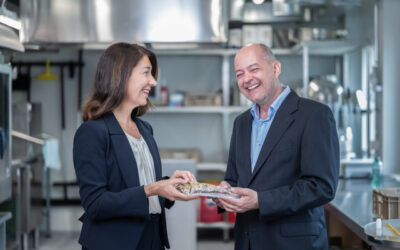Impact Digests | Can we scale up regenerative farming for a sustainable future?

We recently held our third Impact Forum event, featuring four distinguished speakers who shared their insights on accelerating regenerative farming practices to restore harmony with nature. The event highlighted the urgent need to adopt regenerative agriculture as a solution to live within planetary boundaries. Read on to explore some of the key insights from the event.
Key Takeaways
- Farmer-centric approaches: Success in regenerative agriculture starts with educating and supporting farmers through training, community building, and funding mechanisms.
- Collaboration is key: Effective partnerships among farmers, researchers, companies, and other relevant organizations and associations are vital for accelerating the adoption of regenerative practices.
- Outcome-based measures: Regenerative farming prioritises implementing approaches that improve soil health and biodiversity. While this may lead to a temporary reduction in quantity during the transition phase, over time the system usually becomes even more productive.
Alex von Hettlingen, Regenerative Schweiz
- Alex von Hetlingen spoke about the importance of farmer education and community support in regenerative agriculture. He spoke about Regenerative Schweiz’s specialised courses for different types of farmers, including arable, vegetable, and forage production.
- He also discussed the key principles of regenerative agriculture: soil biome restoration, plant and animal health, and local nutrient and water cycles.
- Alex emphasised that there is no quick fix, there is a need for soil research, and that there is no regenerative economy without restored soils.
Anita Frehner, FiBL
- Anita Frehner expanded the perspective from production to the entire food system, stressing the importance of policy interventions to support sustainable farming practices through subsidies and legal requirements.
- She spoke about the need for holistic solutions, with the need for reduced food waste and dietary changes alongside changes in farming practices.
- Anita also emphasised the need for collaboration among different sustainable farming practices to achieve broader sustainability goals.
Piera Waibel, Earthworm Foundation
- Piera gave us an introduction to Earthworm Foundation and its regenerative agriculture transition projects. The foundation collaborates with companies to improve their supply chains, focusing on holistic and collaborative methods.
- She spoke about success factors for scaling these kinds of projects, including collaboration across value chains, baseline assessments to determine context specific improvement potential, and funding mechanisms to support farmers during the transition.
- Piera stressed the importance of collective commitment and engagement across the entire value chain. She also shared that transitions should focus not only on environmental outcomes but also consider social aspects like farmer autonomy and resilience.
Philippe Birker, Climate Farmers
- Philippe Birker highlighted the failures of the current agricultural system, including ecological degradation, economic inefficiencies, and social challenges faced by farmers.
- He discussed Climate Farmers’ key initiatives, including connecting farmers with events and training, policy engagement, and providing practical tools like holistic context assessments, carbon credit schemes, and regenerative agriculture verification to support farmers practically.
- Phillippe highlighted the importance of making farming appealing again through regenerative practices and community support. He called for increased collaboration across the sector, and stressed the importance of data and verification to ensure practices are genuinely regenerative to avoid greenwashing.
Regenerative farming for a healthier future
The event concluded with a Q&A session, where we cleared up a few critical points concerning regenerative vs. organic farming. Regenerative agriculture is outcome-based and focuses on soil health and biodiversity, while organic farming is practice-based with strict input restrictions.
The integration of regenerative farming holds great promise for improving environmental sustainability, food security, and resilience. Collaboration, education, and innovation are key to realising its full potential.
Thanks to everyone who joined us!
Hungry for more? We’ll be hosting three more Impact Forums on the topics of precision nutrition, sustainable packaging, and sustainable protein in Q3 and Q4. Click on the links to save your space for free.
Never miss a Swiss food innovation morsel.
Latest News
Yumame Foods and Le Patron partner for a delicious, plant-based future of food
Valley partner Yumame Foods and the...
What the food industry can learn from GDI’s Major Shifts model
The future is coming faster than many...
Meet the finalists of the Igeho Rising Star Award for 2025
Many startups applied. 15 made it to...
Nestlé and IBM leverage AI and deep tech to unlock new packaging innovations
Valley partner, Nestlé R&D has...




